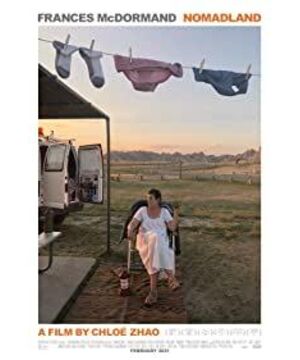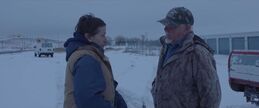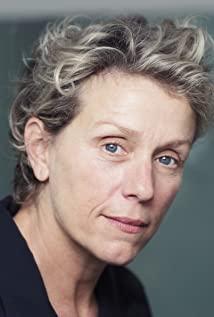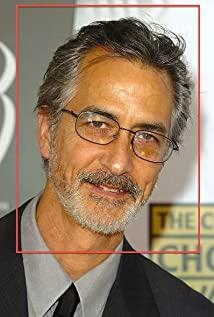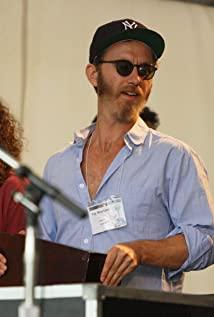By: Alfonso Cuaron / Interview (December 3, 2020)
Proofreading: Qin Tian
The translation was first published in "Iris"
There are brief moments in No Country that make you feel like you're watching a documentary—perhaps a critique of Amazon-influenced American industry, or a real look at the country's vast network of converted RVs . But then Francis McDormand reappears, and you're reminded of this naturalistic film directed by Ting Zhao, which is actually a heartbreaking work of fiction. Based on Jessica Bruder's 2017 non-fiction book of the same name, the film is set in the American West of senior citizens who choose to leave society after the Great Depression and wander around in search of work. "I'm not homeless, I'm just houseless," says McDormand, a widow named Fern who lives in a converted RV. No Country is a destinationless road movie.
It is also Zhao Ting's third film after 2015's "The Song My Brother Taught Me to Sing" and 2017's "Knight," a film about a struggling cowboy that won the 38-year-old director global acclaim. Like its predecessor, No Country relies heavily on untrained actors to play their roles to create a sense of community that enriches the story, even of the world's best Casting directors are also hard to match. The film also casts the Beijing-born director as a key chronicler of America's heartland—a journalist, a voyeur, but always a poet. Zhao Ting's next film is the Marvel space saga "The Eternals," starring Angelina Jolie and Richard Madden, which marks a giant leap and even has five Oscar-winning statuettes The famous director Alfonso Cuaron is in solidarity with it.
———
Cuaron: I finally got to see Nowhere, but I wasn't ready at all. You took me on an amazing journey I've never been on before. I like movies where I don't fully understand the process because that's where I find the mystery. Let's start with the idea of the film.
Zhao Ting: When I was filming "The Song My Brother Taught Me To Sing" and "Knight", I had a lot of travel experience, and slowly I wanted to make a road movie. After The Knights came out, Frances McDormand and her collaborators, who got the rights to No Country at the time, called me, we met, and that's how it all started .
Cuaron: What was the script writing process like?
Zhao Ting: The original novel is non-fiction, and the character Fern does not exist. But the author introduced me to Crystal, Arizona, where the nomads meet. Characters including Swankie, Linda May and Bob Wells are featured in the book. I did a lot of research for The Song My Brother Taught Me To Sing and The Rider, but by the time this film came, most of the work had already been done in the book. My job is to create a fictional character whose emotional journey can be organically combined with some of the fun stuff in the book.
Cuaron: Obviously the script has some kind of structure. How many scenes were written in the script, and how many were discovered on the spot?
Zhao Ting: We have a script of about 90 pages, which is about the same length as a typical movie in terms of what should happen in each scene. But, for example, when I met Swankey, the first thing she showed me was a video of Swallow and told me about her travels and kayaking across America. I put that story into the script. While we were filming this scene, I wrote what she had to say into the script. While she may have deviated from the script in some places, we were mostly following the script.
Caron: You were born in Beijing, then studied in London, then went to NYU, and now live in California. How do you explain your fascination with the middle of America?
Zhao Ting: It's really hard to explain, but if I go back in time, I can rationalize it a bit. While growing up in Beijing, I always loved going to Mongolia. From big cities to plains, that was pretty much my childhood. In my 20s, I was in New York for a long time, and I felt a little lost. I often joke that when people feel lost, they tend to go west. For me, west is west of New York. It's just part of America and I don't know anything about it. For example, South Dakota is basically a ranch state. But I've never been to that place. It feels ancient and still. My life was so short and fast, and when I got there, it felt so good, it was like time had stopped.
Cuaron: I think one of the beautiful things you do is that you are involved. You share their experiences. In other words, it's an act of empathy. You're not objectifying your characters - you're actually observing them. Because of this, we are close to all the characters. The film is full of social commentary, but it doesn't turn into a strong political statement. You just flow with it because your focus is on the humanity of these characters without any judgment. It's as if you're just participating in their presence. I think it's very special.
Zhao Ting: Thank you. But in fact as long as the camera is pointed at something, you are already making some kind of statement. This is inevitable because you add a perspective to it. I find that sometimes when I enter an unfamiliar community, or a community with a lot of problems, I have to refrain from saying something about how they could be better off, or how the government has wronged them. Many times, they will tell me what they think I want to hear because they have been interviewed by reporters so many times. Often reporters want them to say something specific because there is some kind of agenda setting in it. I listened to them talking to me as if they were programmed. You have to wait until this is over before you can start asking, "Which football team do you support?" or "Tell me about your high school sweetheart."
Cuaron: It's very impressive, because in this age where everything is polarized and ideological, not a single discussion in the film is like that. When Fern asked her sister's friends about real estate, it wasn't about making a political statement about the economic system, but about her life choices.
Zhao Ting: Filming is for communication. I am afraid that I will end up making films only for those who already agree with me. That way, I will only continue to consolidate our own ideas. I'd rather have someone who doesn't agree with my political views watch my movie and then unexpectedly see themselves in the movie than get a standing ovation from a room full of people who already agree with me.
Cuaron: You can't predict what the audience will like. If you do, they won't be surprised. That's the beauty of your movie. What I don't understand is how you're working on a Marvel movie at the same time as Nowhere.
Zhao Ting: It is the transition from a small scale to a large scale.
Cuaron: But I don't make one film while another film is being made. I'm too lazy.
Zhao Ting: When I was filming "Nowhere", I wasn't really preparing for "The Eternals" because that was impossible. There is a gap between the two so I have time to do some prep work. After finishing Nowhere, I threw myself into The Eternals. In fact, I find it beneficial for me to be able to juggle both. They are so different that I can escape from one place to another when I need to.
Cuaron: It's easy to make a movie that questions, criticizes, and shows all the wrongdoings of human beings, but this is a movie about kindness. Another thing about Nowhere is your collaboration with photographer Joshua (Joshua James Richards). There seems to be a telepathy between the two of you.
Zhao Ting: Part of the reason is that he stayed with me during the editing of these three films. I always cut a version first so he could understand how I wanted to cut it. I don't need to tell him how to mulch because many times he knows where I'm going to cut. That's probably why we work so well together.
Cuaron: Let's talk about Francis again. We've always known Francis was a miraculous actor, but this performance was arguably a miracle of miracles. She is Fern. You don't know who's a professional actor and who's not, who's a real nomad and who's an actor. There she is. Did you find her after you wrote the script?
Zhao Ting: There was no script when we met. The original idea was for Francis to play Linda May. We met after Francis saw "The Knight," and we all agreed that Linda May should play herself, and Francis would play a fictional character that ties everyone together. We really want Francis to be a part of Fern too. including their names. As soon as we met, Francis said to me, "I've been thinking about changing my name to Fern by the time I'm 65, smoking Lucky, drinking wild turkey, and hitting the road in an RV. . This is my dream." In this film, she graciously lets us have so much of her life. Even Melissa Smith, who plays Fern's sister, is Francis' best friend in real life.
Cuaron: In such a quiet film, with no plot twists or big moments, it was very brave for Francis to have faith and belief in her character. In a contemporary world that embraces dramatic action, she simply allows her characters to have the same gentle and quiet frequency as the surroundings and the people around them. This is really impressive.
Zhao Ting: It is really difficult. Like you said, louder voices and more exaggerated movements are usually appreciated, but life is not like that. Especially on the road, when you're witnessing the lives of that group of people, it's not about deadlines and there are no dramatic twists and turns. It's more about the fleetingness of life, a feeling of being part of the ebb and flow of nature, where everything is where it should be. It was important for us to make sure Fern's journey was not a plot twist, but an inner journey through time.
Cuaron: A lot of actors want to express their feelings with important monologues.
Zhao Ting: There is an incredible thing that taught me a lot. Her RV broke down so she was going to the mechanic and I wrote a scene - she would get mad at the mechanic because he suggested she sell the car. But when we got to the auto repair shop, the mechanic was actually one of the gentlest men I've ever met. The only job he likes is fixing other people's cars, because he thinks cars are life in Nebraska. "People come to me a lot and it feels like their life is over when their car breaks down, so I'd love to help them," he said. Francis is amazing as an actor and as a regular person, In that moment, she was deeply connected to him. She wouldn't let herself succumb to that unnatural script because she was really connected to him. As a result, her performance has changed in some way, much better.
Cuaron: You have a lot of confidence in the films you make.
Zhao Ting: But deep down, we were all scared to death.
Caron: (laughs) That's for sure.
Zhao Ting: On the day of the premiere, our state was like, "Is the movie really finished?" You also have to trust the audience. I think a lot of people might fall asleep, but those who didn't might have a different experience.
Original link:
https://www.interviewmagazine.com/film/chloe-zhao-and-alfonso-cuaron-on-the-quiet-compassion-of-making-a-movie
View more about Nomadland reviews


